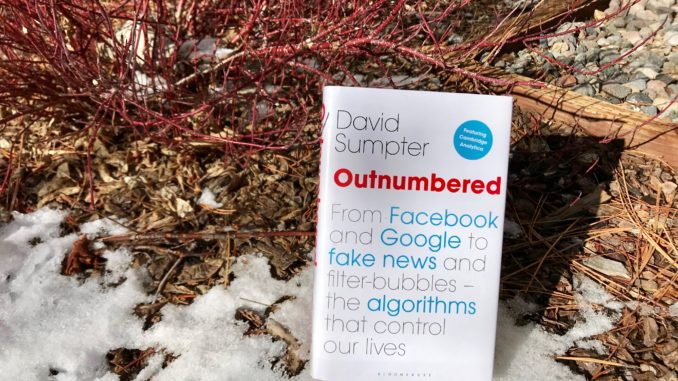
“If you are regularly using Facebook, Instagram, Snapchat, Twitter or any other social media site, then you are outnumbered. You are allowing your personality to be placed as a point in hundreds of dimensions, your emotions to be enumerated and your future behaviour to be modeled and predicted. This is all done effectively and automatically, in a way that most of us can hardly comprehend.”
Algorithms are “making arbitrary decisions about us, often based on dubious assumptions and inaccurate data.” The process is a closely held secret by public companies and Silicon Valley, and it is always changing.
So Dr Sumpter investigated the algorithms that affect us and ran his own math experiments to test them. His results are clearly and engagingly explained in this book.
Dr Sumpter is Professor of Applied Math in the University of Uppsala, the oldest university in Sweden and all Nordic countries. He researches machine learning, statistical models, and artificial intelligence.
He tells the fascinating ways algorithms predict and affect our behaviour: what really happened with Cambridge Analytica; why Google algorithms are racist and sexist; how Facebook did not really sway the elections; how we create our filter bubbles; how conspiracy theories spread online; how women choose men on dating sites; and how books and records become bestsellers.
There are many ways algorithms can skew what we see online, whether as search results, news feeds, ads, or recommendations. But it’s not always correct and its predictions are limited. Dr Sumpter gives a sobering skepticism to allay our fears that algorithms will control us.
Should we worry that artificial intelligence will take over the human race? No because our algorithms now only have “advertising intelligence” and “we’re still figuring out what real intelligence is.” Algorithms have not yet been used to solve real world problems.
“These algorithms have the potential to reduce the menial tasks we have to do, but they won’t be anything like humans.”
If we know its limits, we won’t feel outnumbered anymore.
More nonfiction book reviews on Instagram @IvyDigest.
